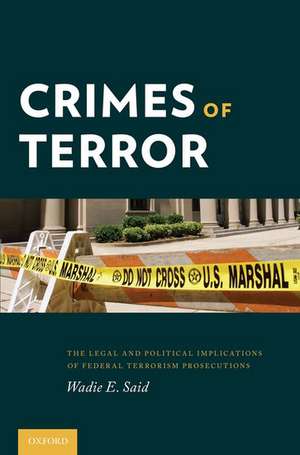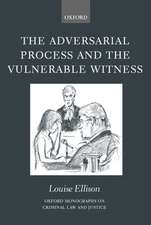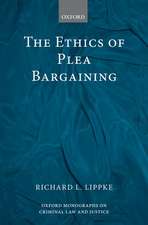Crimes of Terror: The Legal and Political Implications of Federal Terrorism Prosecutions
Autor Wadie E. Saiden Limba Engleză Paperback – 22 mar 2018
| Toate formatele și edițiile | Preț | Express |
|---|---|---|
| Paperback (1) | 194.93 lei 31-37 zile | |
| Oxford University Press – 22 mar 2018 | 194.93 lei 31-37 zile | |
| Hardback (1) | 472.45 lei 31-37 zile | |
| Oxford University Press – 21 mai 2015 | 472.45 lei 31-37 zile |
Preț: 194.93 lei
Preț vechi: 241.10 lei
-19% Nou
Puncte Express: 292
Preț estimativ în valută:
37.30€ • 39.05$ • 30.86£
37.30€ • 39.05$ • 30.86£
Carte tipărită la comandă
Livrare economică 26 martie-01 aprilie
Preluare comenzi: 021 569.72.76
Specificații
ISBN-13: 9780190296810
ISBN-10: 019029681X
Pagini: 232
Dimensiuni: 155 x 231 x 15 mm
Greutate: 0.36 kg
Editura: Oxford University Press
Colecția OUP USA
Locul publicării:New York, United States
ISBN-10: 019029681X
Pagini: 232
Dimensiuni: 155 x 231 x 15 mm
Greutate: 0.36 kg
Editura: Oxford University Press
Colecția OUP USA
Locul publicării:New York, United States
Recenzii
These and other cases dissected in Crimes of Terror will be familiar to readers with a critical background in law and national security, who will find the book a helpful reference guide, with crucial citations to relevant authorities on the matter, including some of Said's academic work on the topic. For everyone else - the vast majority of readers who will come across this work - Said's is a vital contribution to an underappreciated area of law, accessibly crafted for an audience who will experience firsthand that nothing is immune from the nebulous, manipulative concept of terrorism - especially not the U.S. criminal justice system.
Professor Said has written an enormously important book on terrorism prosecutions and how they are changing the fundamentals of our criminal justice system. Written with the experience of a criminal defense lawyer who has handled these cases, Professor Said examines each stage of a terrorism prosecution and how it abandons the usual rules for criminal cases. This must-read book is deeply disturbing as he shows how these prosecutions have had a devastating effect on Muslim Americans and their ability to be politically engaged." -Erwin Chemerinsky, Dean and Distinguished Professor of Law, Raymond Pryke Professor of First Amendment Law, University of California, Irvine School of Law
The war on terror has been waged not only on the battlefield, but in domestic criminal prosecutions, where the tools are not drones or infrared goggles, but sweeping laws making it a crime to provide 'material support' to blacklisted groups, and where the prosecution can rely on informants who entrap vulnerable young men into agreeing to commit manufactured crimes. Professor Said's book documents the sacrifices to due process and fundamental fairness that criminal prosecution of 'terrorists' has already wrought, and eloquently warns against further eviscerations of those principles." -David Cole, Hon. George J. Mitchell Professor in Law and Public Policy, Georgetown University Law Center
Crimes of Terror begins with this question: If the government charged you with being a terrorist, would you rather face criminal charges in a federal court or be tried before a military commission? Read this book to be educated in how the 'war on terror' has compromised rights of the accused in a federal court and, more so, how it threatens to radically change our concept of a free society and the right to be politically or religiously engaged." -Mahmood Mamdani, Herbert Lehman Professor of Government, Columbia University
Since 9/11, the U.S. government has pursued extraordinary legal (as well as extralegal) efforts to combat terrorism, and in doing so has expanded the 'terrorist' label far beyond its previous connotations. Said argues that measures taken by the courts have created an effective 'terrorist exception' to previously existing legal standards. Crimes of Terror examines the way in which this exception has altered normal law enforcement and judicial practices at every stage of the legal cycle, from initial investigation and evidence gathering, to trial, and finally to sentencing and incarceration. Crimes of Terror documents what Said says is a willful, ongoing effort by the government to blur the line between peaceful activism and terrorism, wherein people advocating for unpopular political causes are treated by the legal system in the same manner as those accused of committing violent acts." - Murtaza Hussain, The Intercept
Professor Said has written an enormously important book on terrorism prosecutions and how they are changing the fundamentals of our criminal justice system. Written with the experience of a criminal defense lawyer who has handled these cases, Professor Said examines each stage of a terrorism prosecution and how it abandons the usual rules for criminal cases. This must-read book is deeply disturbing as he shows how these prosecutions have had a devastating effect on Muslim Americans and their ability to be politically engaged." -Erwin Chemerinsky, Dean and Distinguished Professor of Law, Raymond Pryke Professor of First Amendment Law, University of California, Irvine School of Law
The war on terror has been waged not only on the battlefield, but in domestic criminal prosecutions, where the tools are not drones or infrared goggles, but sweeping laws making it a crime to provide 'material support' to blacklisted groups, and where the prosecution can rely on informants who entrap vulnerable young men into agreeing to commit manufactured crimes. Professor Said's book documents the sacrifices to due process and fundamental fairness that criminal prosecution of 'terrorists' has already wrought, and eloquently warns against further eviscerations of those principles." -David Cole, Hon. George J. Mitchell Professor in Law and Public Policy, Georgetown University Law Center
Crimes of Terror begins with this question: If the government charged you with being a terrorist, would you rather face criminal charges in a federal court or be tried before a military commission? Read this book to be educated in how the 'war on terror' has compromised rights of the accused in a federal court and, more so, how it threatens to radically change our concept of a free society and the right to be politically or religiously engaged." -Mahmood Mamdani, Herbert Lehman Professor of Government, Columbia University
Since 9/11, the U.S. government has pursued extraordinary legal (as well as extralegal) efforts to combat terrorism, and in doing so has expanded the 'terrorist' label far beyond its previous connotations. Said argues that measures taken by the courts have created an effective 'terrorist exception' to previously existing legal standards. Crimes of Terror examines the way in which this exception has altered normal law enforcement and judicial practices at every stage of the legal cycle, from initial investigation and evidence gathering, to trial, and finally to sentencing and incarceration. Crimes of Terror documents what Said says is a willful, ongoing effort by the government to blur the line between peaceful activism and terrorism, wherein people advocating for unpopular political causes are treated by the legal system in the same manner as those accused of committing violent acts." - Murtaza Hussain, The Intercept
Notă biografică
Wadie E. Said is Professor of Law at the University of South Carolina School of Law, where he teaches criminal law, criminal procedure, and human rights law. His scholarship has appeared in the Ohio State Law Journal, Brigham Young University Law Review, the Indiana Law Journal, the Washington Law Review, and the Columbia Human Rights Law Review. Before joining the South Carolina faculty, he represented terrorist suspects as an assistant federal public defender in Tampa, Florida, serving as counsel in United States v. al-Arian, one of the largest terrorism prosecutions in American history. A graduate of Princeton University and Columbia Law School, he clerked for Chief Judge Charles P. Sifton of the U.S. District Court for the Eastern District of New York.













